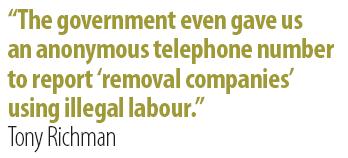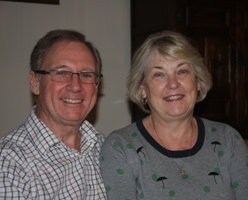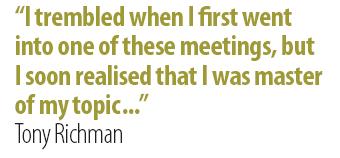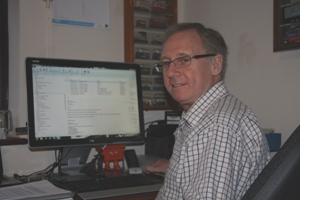The moving industry is full of people like Tony Richman. People who were born into the business, joined the family firm when they left school, did every job that there was to do and ended up, inevitably perhaps, running the company. That part of Tony’s story is not unusual. What came next, is extraordinary. Steve Jordan caught up with the moving industry’s European connection to find out more.

I have known Tony Richman for at least 30 years, probably longer. Back in the days when we both lifted a box or two we helped each other out with an occasional back load and met at conferences. But it was Tony’s performance at BAR meetings that I really remember best. He would sit in quiet low profile, volunteering a contribution rarely unless asked. Until his turn came: the External Affairs report. Then he came alive. There was nothing he didn’t seem to know, no stone left unturned, no angle uncovered, no detail of the legislation - no matter how arcane - that he hadn’t mastered. He was a one man, walking, talking encyclopaedia. A square peg firmly implanted in a square hole.
Early days
He is the fifth generation of his family to run the moving company started in 1880. At five years old he would ride in the trucks, at 17 he passed by university to join the company working with his brother, Trevor (three years his junior), his uncles and his dad, Leonard, whom those who can remember the BAR conferences of the early 1970s will recall.
The company was successful, though occasionally challenged by family politics. It split after the War into Richman Bros. and H+L Richman, then got back together again in the 1950s. In 1967 the company bought Rings of Rochester with Tony despatched to make it a success. Again the companies came together in 1984. In 2004 the company was sold to Doree Bonner ending the dynasty just a few months short of its 125 year anniversary.
Tony remembers fondly the early years, especially the trips to Europe. “In those days the lorry had to be craned on and off the ship,” he recalled. “The first RORO service I went on was from Felixstowe. There were only three trucks on it, a far cry from the 1000s a day that run today.”
the early years, especially the trips to Europe. “In those days the lorry had to be craned on and off the ship,” he recalled. “The first RORO service I went on was from Felixstowe. There were only three trucks on it, a far cry from the 1000s a day that run today.”
The ultimate committee man
It was while Tony was still running the company, in the early 1970s, that he became involved with BAR. “I did the ground work,” Tony explained. “I was Chairman of the Labour Relations Committee, Chairman of the National Council, a member of the BAR Board, in fact I think I am still BAR’s longest ever serving Board member.”
Working groups were set up by BAR in the late 80’s including one called External Affairs of which Tony was made Chairman. “There was a host of people who worked very hard on that committee,” Tony explained. “Colin Quarrington and I worked very well together. David Trenchard became my Vice Chairman.” The role was to work with government to try to get legislation passed that would help the moving industry and, perhaps more importantly, make government aware of the ways in which it differed from general haulage to ensure that the industry was not burdened with legislation that was inappropriate. It was a tough job.

“We were working on a lot of things, for example parking for trucks in cities and cash-in-hand labour. The government even gave us an anonymous telephone number to report ‘removal companies’ using illegal labour. Another difficult dossier surrounded the FSA Insurance Regulations – but we got there in the end and achieved the derogation for those that wanted to use it.” Tony also lobbied for VAT on self storage, something that only came to fruition in 2012, but all the hard work had been done long before. “There was a lot of leg work, being passed from department to department. It often involved working with the shadow party because the party in power is not keen to change existing laws.”
It was in 1988 that BAR decided to again become a member of FEDEMAC (Federation of European Movers Associations) after a ten-year absence, and appointed Tony as its representative. He became a FEDEMAC Board member the following year and its President in 1993-97. FEDEMAC was using a professional lobbying company to lobby the European Commission or the European Parliament. “But they didn’t know our industry,” explained Tony.
Professional lobbying
In 2004, when Tony’s moving company was sold, BAR asked him to continue on a professional, part-time basis to provide the lobbying and representation service. Two months later FEDEMAC did the same. Tony joked: “I wondered if I might get the same rate as the Belgian lobbying company, but it didn’t quite work out that way! Their hourly charges far exceed my daily charge! I went on a crash course to teach me how to get past the secretary, into the inner workings of the European Parliament and how to put my message across.” Tony did spill some of the beans on how to dodge the most persistent gate keeper. I could tell you, but if I did ….
“I trembled when I first went into one of these meetings,” he said. “But I soon realised that I was master of my topic whereas they only had a peripheral knowledge and really knew nothing about the details affecting or likely to affect the moving industry. I realised that if I was diplomatic, never closed doors, and engaged with them, we could help each other.” Eventually Tony got to the stage that the European Commissioners were coming to him, not the other way around.
Again there were successes. The EC wanted to bring in a rule that nobody should lift more than 25kg. Tony got an exemption for movers by pointing out that this would require more men to lift a piano and you can get around one; he got an exemption allowing trucks over ten years old to be used for European work on the basis that moving vans don’t do the same mileage or carry the same weight as hauliers’ vehicles; he also negotiated an exemption from the Swiss road tax and exemptions on operators licenses.
There were also bigger battles. The UK’s system of taking in imports on a C3 form came under attack. It was the only country with this system in place when the single European market began in 1993. It looked for a time that this privilege would be taken from the UK but over time Tony managed to get similar procedures in place for other countries too. “I figured it was better for us to lose the exclusivity rather than lose the whole thing.”
Then there’s the hot potato of European VAT harmonisation. He’s been working on it since 1993 and, although there is still work to do, much has been achieved. Tony has been fighting for a one-stop-shop for companies to make combined declarations for all European transactions. In 2010 he was successful for VAT refunds. The system for VAT payments is still unresolved – but an official proposal has now gone through to the European Commission and a trial will start in 2015 for some industries. A further plus point being the EC acceptance in putting forward a proposal in October for a harmonised EU VAT Return form which is another major step. Tony expects the full one-stop-shop to be in place by 2020.
The turning
In 2009 it appeared as if the industry that Tony had served all his working life turned against him. For reasons of which he is still unsure, BAR suddenly dispensed with his services. He continued working with FEDEMAC but the workload was high and the rewards modest. In October 2013, after Tony asked for either more money, less work or somebody to work alongside him, the organisation replaced him with a younger, less experienced person on twice his salary. Again, Tony is perplexed as to why. It does seem a strange way to treat someone of his experience, dedication and capability. He had over 130 dossiers on his desk when he left.
The future
But he remains positive. He is still providing a similar service on a part time basis to FEDESSA (Federation of European Self Storage Associations), he is looking forward to having more time to spend with his wife, Frances, and plans to indulge in his hobbies of ornithology and playing the drums (Tony played in a band called The Blackstars in the 1960s. In addition to their own gigs they had the opportunity to support the great and the good including The Small Faces and a very young David Bowie when he was in a band called The Mannish Boys).
At nearly 67 he’s not ready to retire yet. He is a man who is passionate about the industry and has built up, throughout his work at Westminster and Brussels, an influential contact list. He is urbane, liked and respected wherever he goes and has a unique ability that makes him a priceless asset to the industry; sadly some seem unable to recognise pearls when they are cast before them. He has much more to offer, given the opportunity.
For me, my interview with Tony was a delightful afternoon spent with a good friend. There will be plenty more. I am also pleased to report that Tony will start a monthly column in The Mover, reporting on European issues, next month. Watch this space.
Photos from top: Tony at his beloved drums; Tony and his wife Frances; Still working at 67.
Click here to see the next Editor's pick